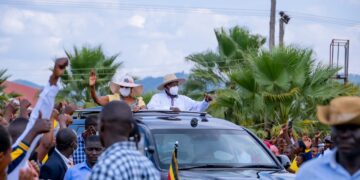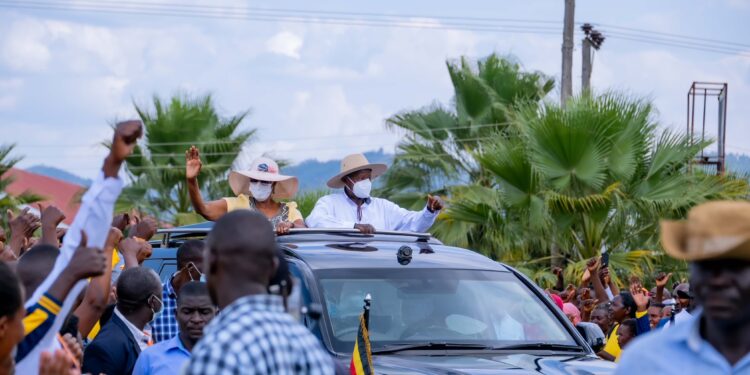President Yoweri Kaguta Museveni has urged leaders in the Kigezi sub-region to prioritise wealth creation and household income as key strategies to reduce poverty and drive socio-economic growth.
“My main message is prioritizing the NRM message on wealth creation. Uganda has many development needs, but prioritization is crucial. As the Bible says: ‘Seek first the kingdom of God, and all these things shall be added unto you,’” he said.
Museveni, on a performance assessment tour of wealth creation and the Parish Development Model (PDM), made these remarks in Rukungiri. The PDM is a government initiative aimed at transforming Uganda’s economy by extending financial assistance directly to communities at the parish level. Each parish SACCO receives Shs. 100 million annually for income-generating enterprises.
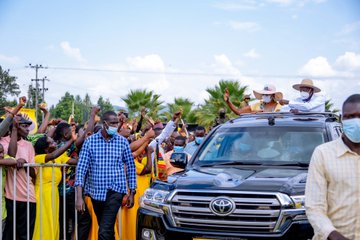
“Leadership is like medical work; just as doctors diagnose patients, leaders must identify and address societal needs. It’s not just about tarmac roads and electricity; prioritising initiatives like the PDM ensures all households engage in income-generating activities like commercial agriculture.”
He noted that the tarmac road from Kampala to Kabale has existed since 1963, yet poverty persists along it. Conversely, areas like Nyabusozi, which embraced commercial dairy farming, have become prosperous without tarmac roads. In 1996, the NRM adopted commercial agriculture as a poverty eradication strategy, advocating the four-acre model: one acre for coffee, one for fruits, one for food crops, and another for pasture. Additional income sources include poultry, piggery, and fish farming.
“Those who listened to our message escaped poverty. As leaders, letting people suffer in poverty when solutions exist is a big mistake,” he emphasised, citing testimonies from successful PDM beneficiaries.
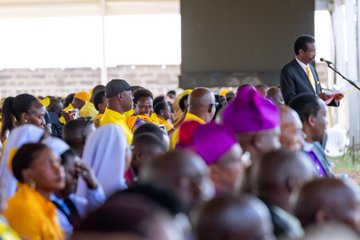
Museveni also warned against corruption in the PDM, vowing to arrest those who steal from the poor. “All stolen money must be returned. Beneficiaries must receive their full Shs. 1 million.”
Regarding agriculture, he proposed establishing a processing factory for surplus eggs in Kabale, similar to how Uganda developed powdered milk production to expand market reach. “Instead of just selling raw eggs or using them in Rolex chapatis, we should process them into baby food for local and global markets.”
He also condemned religious divisions in Kigezi, calling them “greedy enemies of Uganda.” He urged leaders to promote unity and economic cooperation, reminding them that business transcends religious lines.
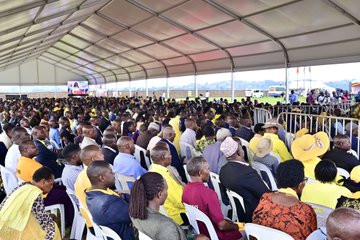
On environmental protection, he emphasized the need to properly utilise wetlands for sustainable agriculture and water supply.
PDM Performance in Kigezi
PDM National Coordinator Hon. Dennis Galabuzi Ssozi reported that Shs. 88.8 billion had been distributed among 428 PDM SACCOs across Kigezi’s six districts and three municipalities. Kanungu received the highest allocation (Shs. 20.2 billion), while Kisoro Municipality received the lowest (Shs. 1.5 billion). The overall disbursement rate stood at 98.5%, with Rukungiri Municipality surpassing 100% due to accumulated interest.
Approximately 88,000 households benefited, with 38% engaged in crop farming and 20% in livestock, mainly piggery. Women constituted 58% of beneficiaries, and 13% were elderly, exceeding their designated quota. The program allocated 30% of funds to youth, 30% to women, 10% to elders, 10% to persons with disabilities, and 20% to other community members.
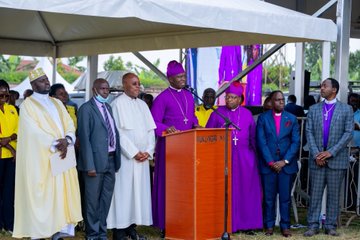
Galabuzi reaffirmed that all bank charges had been covered by the PDM Secretariat to ensure full disbursement to beneficiaries. “Anyone deducting money is engaging in criminality and will be arrested.”
Community Concerns on PDM
Residents voiced concerns about inequitable fund distribution. Mr. Mbabazi Pieri of Rubanda decried imbalances, noting that some parishes with more villages receive the same Shs100 million as smaller ones.
Ms. Kembabazi Loy of Kanungu called for transparency in beneficiary selection, citing corruption-related deletions from the list. Mr. Turyabagyenyi Immy of Rukungiri urged inclusion of the deaf, requesting sign language interpreters.
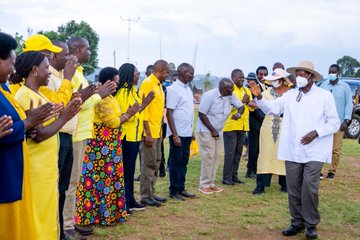
Mr. Akampurira Gideon of Rukiga argued that excluding local leaders from PDM benefits hinders implementation, while Mr. Karuru Godfrey of Kisoro claimed the program was benefiting the well-off instead of the poor.
Emyooga Programme in Kigezi
State Minister for Microfinance, Hon. Haruna Kasolo Kyeyune, presented an update on the Emyooga programme, designed to encourage savings among daily earners through SACCOs. Categories include boda boda riders, taxi operators, market vendors, shoemakers, journalists, and artisans.
Kabale received Shs. 2.2 billion for 52 SACCOs, Rubanda Shs. 1.64 billion for 32 SACCOs, Kisoro Shs. 3.46 billion for 17 SACCOs, Kanungu Shs. 1.84 billion for 36 SACCOs, Rukiga Shs. 740 million for 18 SACCOs, and Rukungiri Shs. 2.5 billion for 54 SACCOs. Additional annual seed capital of Shs. 20 million is provided.
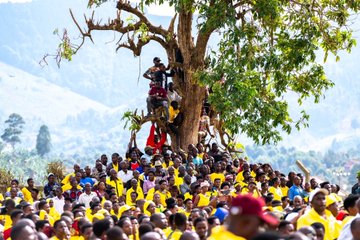
Despite concerns over loan defaults, SACCO savings have reached Shs. 2.52 billion, with Kisoro leading at Shs. 1.1 billion. “The Emyooga programme has been successful, with beneficiaries showcasing impressive products and services,” Kasolo noted.
Museveni promised to return for a special meeting on tea growing in the sub-region.
